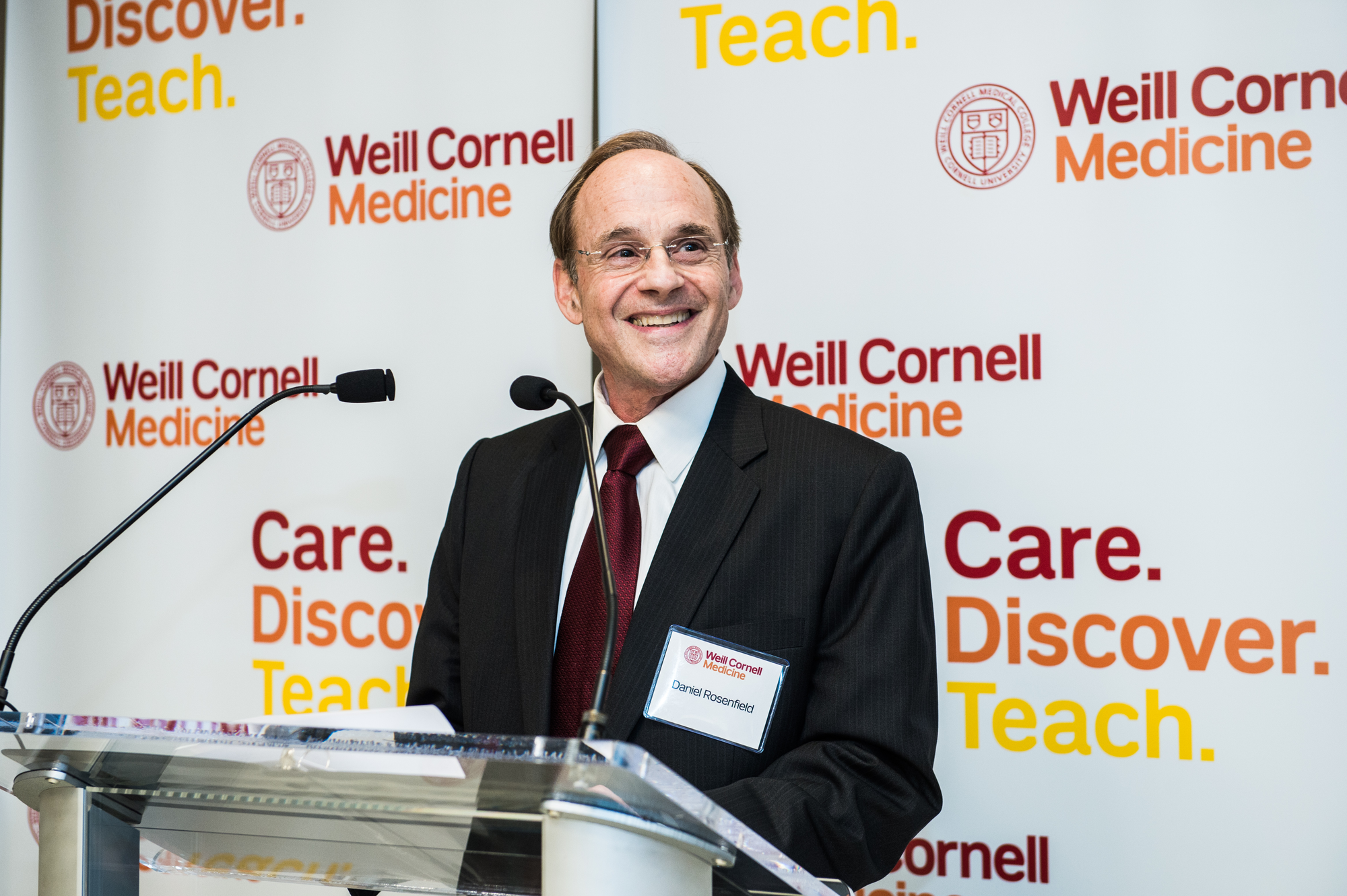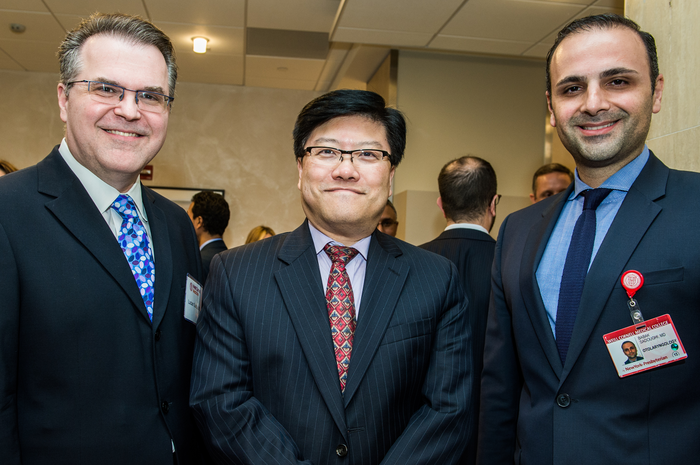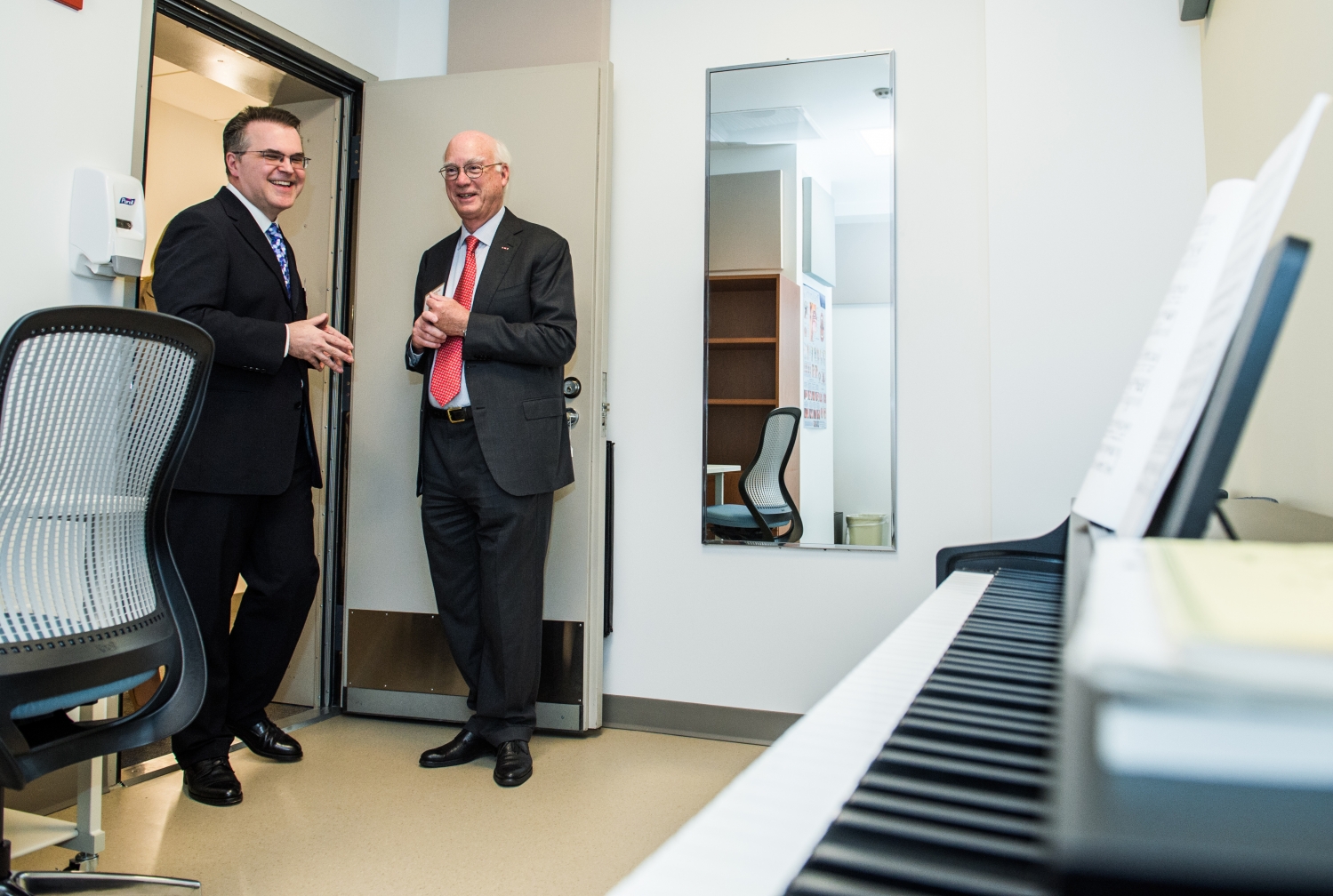Dr. Lucian Sulica, left, shows Cornell University Emeritus Trustee John S. Dyson an exam room in the new Sean Parker Institute for the Voice. All photos: Studio Brooke
The Sean Parker Institute for the Voice celebrated the opening of its new state-of-the-art facility on the corner of East 59th Street and Second Avenue with a ribbon-cutting ceremony on Nov. 3. The Weill Cornell Medicine institute, which exists under the umbrella of the Department of Otolaryngology-Head and Neck Surgery, was established in 2013 with a generous gift from the Parker Foundation. It focuses on caring for patients with voice disorders, which affect more than 20 million people in the United States.
At the opening ceremony, Daniel Rosenfield offered a patient’s perspective on the importance of care and research for voice disorders. Rosenfield’s voice problems were initially attributed to allergies, acid reflux and a virus before Dr. Lucian Sulica, the inaugural director of the institute, flagged his sudden vocal deterioration as something more serious. A CT scan showed he had a thyroid tumor that was pressing on the nerve to his vocal cord. Rosenfield had the tumor removed surgically and underwent rehabilitation to correct his vocal cord paralysis. He credits Dr. Sulica with saving both his life and his voice. “We cannot be who we are without our voice,” he said.

Sean Parker Institute for the Voice patient Daniel Rosenfield shares his perspective on the importance of care and research for voice disorders at the institute's ribbon cutting ceremony on Nov. 3.
Voice disorders can affect one’s sense of self, and also importantly, the ability to excel in one’s career. People from many different professions rely on their voices at work, including performers, teachers, exercise instructors, lawyers, salespeople and members of the clergy. Under the leadership of Dr. Sulica, the Sean Parker Institute for the Voice has been caring for an increasing number of patients of all ages, with an emphasis on those who utilize their voices in professional settings. The institute works closely with the Center for the Performing Artist at NewYork-Presbyterian/Weill Cornell Medical Center and Weill Cornell Medicine by catering to the needs of entertainers.
The facility on East 59th Street takes the Sean Parker Institute for the Voice to a new level, providing patients with comprehensive access to resources and specialists in one convenient location. Procedure suites are equipped with up-to-date instrumentation for the entire range of office voice procedures and for integrated data collection. The facility features the latest evaluation and treatment technologies in an acoustically optimized environment and also houses clinical research aimed at improving the standard of care.
“The space is designed for state-of-the-art care, and to integrate our patient care and investigational endeavors. As we help our patients, our patients help us understand vocal injuries and advance the field. That’s the central mission of the institute,” said Dr. Sulica, who is also the Sean Parker Professor of Otolaryngology at Weill Cornell Medicine.
A nationally renowned researcher, clinician and educator in the field of laryngology and voice disorders, Dr. Sulica has built the Sean Parker Institute into a thriving program that has served countless performers and others with vocal problems. He continues to advance the field of laryngology through research related to the human voice and the treatment and cures of its disorders.
He is joined by Dr. Babak Sadoughi, an assistant professor of otolaryngology. Dr. Sadoughi is a graduate of the fellowship program run by the Sean Parker Institute and has now returned to help transform it into an international center of excellence in laryngology. His area of expertise is minimally invasive laryngeal surgery.
Since its founding, the Sean Parker Institute has conducted several studies on risk factors and treatments for vocal cord injuries, such as pseudocysts, vocal cord hemorrhage and vocal cord paralysis. It is currently running a clinical trial on voice tremor treatments, as well as a study on vocal cord paralysis aimed at localizing the injury and improving prediction of recovery.

From left: Drs. Lucian Sulica, Augustine M.K. Choi and Babak Sadoughi
“The Sean Parker Institute for the Voice is much more than a doctor’s office. In terms of the opportunity for healthcare advances, we are exceeded by no one,” said Dr. Michael Stewart, professor and chairman of the Department of Otolaryngology - Head and Neck Surgery and vice dean of Weill Cornell Medicine.
This summer the Parker Foundation made a very generous gift to create the Sean Parker Fellowship in Laryngology. This gift will allow the Sean Parker Institute to train clinical research fellows in the field so that an increasing number of practitioners will gain greater insight into how the human voice functions, or sometimes fails to function.
“The grand opening of the Sean Parker Institute for the Voice represents a major advance in Weill Cornell Medicine’s mission to care, discover and teach,” said Dr. Augustine M.K. Choi, interim dean of Weill Cornell Medicine. “Now we have dedicated space to ensure that our patients receive top-of-the-line care in an extremely important, but often overlooked, area of medicine.”

